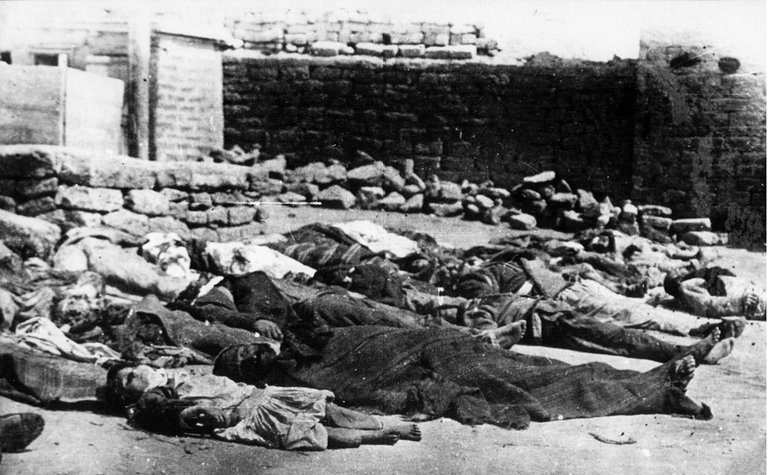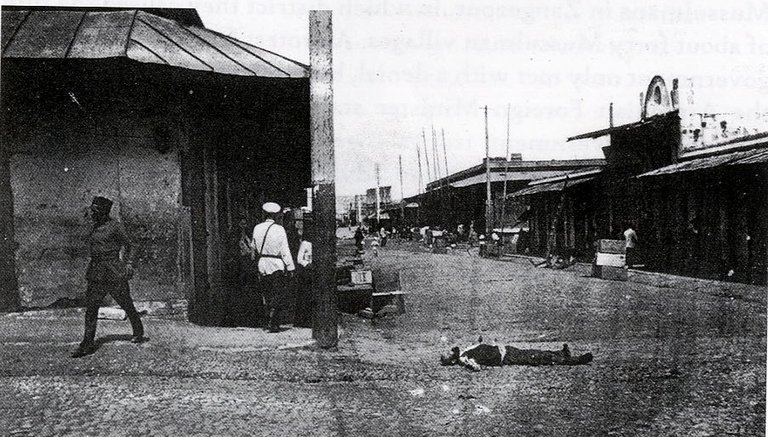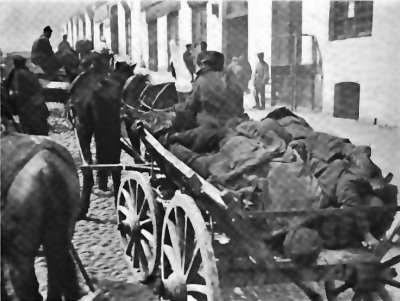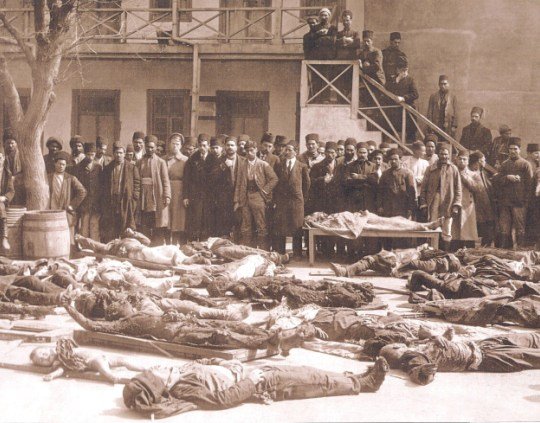
AZ 1918-ci ilin 30 mart və 3 aprel tarixləri arasında Bakı şəhərində və Bakı quberniyasının müxtəlif bölgələrində, eləcə də Şamaxı, Quba, Xaçmaz, Lənkəran, Hacıqabul, Səlyan, Zəngəzur, Qarabağ, Naxçıvan və digər ərazilərdə Bakı Soveti və Daşnaksütundan olan erməni silahlı dəstələrinin azərbaycanlılara qarşı törətdikləri qırğın. Rəsmi mənbələrə əsasən soyqırım nəticəsində 12 minə yaxın azərbaycanlı qətlə yetirilmiş, on minlərlə insan itkin düşmüşdür.
Azərbaycan prezidenti Heydər Əliyevin 26 mart 1998-ci il tarixli Sərəncamı ilə 31 mart Azərbaycanlıların Soyqırımı Günü kimi qeyd olunur.

EN On this day, March 31st, the Azerbaijanis worldwide mark a tragic day in the history of the Azerbaijani people – Genocide Day. This year marks exactly 98 years since the brutal massacre of Azerbaijanis by Armenian Dashnaks and Bolsheviks.
On the night of 30 March 1918, the genocide perpetrated by Armenians resulted in the savage murder of about 11 thousand peaceful Azerbaijanis in Baku alone, including women, children and old men.
The bloodbath lasted for several days. Between March 31st and April 2nd, gangs of Armenian Bolsheviks led by Stepan Shaumyan committed thousands of murders, burned down many houses and places of worship and confiscated private properties. During the indiscriminate slaughter, Armenians bombarded Baku's largest mosque, Tazapir, burned down the Ismaili building, which was considered one of the world's architectural treasures.

The genocide against Azerbaijanis was committed not only in Baku, but also elsewhere in remote areas. For example, on March 31st, Armenian Dashnaks killed more than sixteen thousand Azerbaijanis in Shamakha County and more than two thousand innocents in the villages of Guba. Besides that, they burned down hundreds of villages in Zangezur, Nakhichevan, Lenkaran, Mugan and Nagorny Karabakh. The dashnaks' savagery culminated in the butchery of tens of thousands of innocent Azerbaijanis.
The Extraordinary Commission of Enquiry set up by the Azerbaijani Democratic Republic on July 15, 1918 collected a great number of documents in the aftermath of the mass slaughter and presented them to their government. In 1919, in light of the facts reported, the parliament of Azerbaijan resolved to mark March 31st as Genocide Day of Azerbaijanis. Although in the Soviet times the date of those tragic events was all but forgotten, once Azerbaijan gained its independence, the entire archive of historical documents was re-opened to the public. It resulted in numerous studies, as well as the publication of books covering the tragic events of March 31, 1918. A few years later, on March 26, 1998, President Heydar Aliyev signed a decree titled “Regarding the genocide of Azerbaijanis”. Since then, March 31st is marked every year as Genocide Day of Azerbaijanis.
A variety of events are held worldwide every year, such as conferences and ceremonies of remembrance, to commemorate March 31st as Genocide Day of Azerbaijanis.

TR 31 Mart 1918-de Azerbaycan topraklarında bir soykırım yaşandı. Ermeniler-in Ruslar-la birleşerek hâlâ bağımsızlığını kazanamamış Azerbaycan-da Türk-Müslüman halka, hattâ Yahudi azınlığa karşı yaptığı soykırımı anma günüdür 31 Mart. Evet, 1918`in 31 Mart günü de dahil tam beş gün içinde Ermeniler Bakü merkezli Azerbaycan topraklarında kadın, yaşlı, çoluk, çocuk demeden herkesi yıkıp yakmışlar.
Elde olan belgelere göre 30 Mart – 3 Nisan 1918 günleri arasında Ermeni silahlı çeteleri Azerbaycan-ın Bakü, Şamahı, Guba, Haçmaz, Lenkeran, Hacıgabul, Salyan, Zengezur (şimdi Ermenistan Cumhuriyeti toprakları içindedir), Karabağ (şu an için Ermenistan-ın işgali altındadır), Nahçıvan ve başka bölgelerinde tam tamına bir soykırım gerçekleştirmiş.
Resmi belgelerde 5 gün içinde soykırıma uğrayanların sayısı 25 binden fazladır. Bazen de bu rakamın daha büyük olduğu söylenir.
Hi! I am a robot. I just upvoted you! I found similar content that readers might be interested in:
https://www.facebook.com/notes/armenian-terror/31-march-genocide-day-of-azerbaijanis/957039747685267
Tarixi həqiqətləri burada yazdığın üçün təşəkkürlər.
Borcumuzdu. İmkan olduğu qədər hər yerdə təbliğ etməliyik.